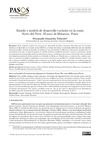Identificador persistente para citar o vincular este elemento:
https://accedacris.ulpgc.es/jspui/handle/10553/35372
| Campo DC | Valor | idioma |
|---|---|---|
| dc.contributor.author | Gonzalez Velarde, Fernando | en_US |
| dc.date.accessioned | 2018-04-13T12:05:48Z | - |
| dc.date.available | 2018-04-13T12:05:48Z | - |
| dc.date.issued | 2017 | en_US |
| dc.identifier.issn | 1695-7121 | en_US |
| dc.identifier.uri | https://accedacris.ulpgc.es/handle/10553/35372 | - |
| dc.description.abstract | Este artículo explora los procesos de desarrollo turístico recientes liderados por la inversión privada y el mercado en la costa norte del Perú, a través del marco conceptual elaborado por los estudios sobre desarrollo y turismo sostenible. Se utiliza el caso del distrito de Máncora, Piura, para analizar las características de lo que el autor denomina el ‘modelo turístico neoliberal peruano’. Luego, se examinan, desde una aproximación etnográfica multi-escalar, las tensiones y problemas que vienen ocurriendo como resultado de la implementación de dicho modelo en el distrito de Máncora. Finalmente, se exploran los cambios ocurridos en materia de política ambiental y los escasos intentos por modificar el modelo turístico actual. Con ello, se busca contribuir al debate sobre el turismo en la región andina, pero sobre todo, se resalta la urgente necesidad de cambiar el rol del Estado en el desarrollo de los destinos a fin de asegurar la sostenibilidad del turismo en el Perú. | en_US |
| dc.description.abstract | This article explores recent processes of tourism development led by the private sector and the market in the North coast of Peru. Based on the case of Mancora, Piura, the author analyses “Peru’s neoliberal model of tourism development”, which has been implemented in the last few decades. Next, the author moves on to examining, through an ethnographic approach, the tensions and problems brought about by the implementation of this model in Mancora. Finally, the author looks at the recent efforts aimed at implementing an environmental policy agenda in Peru and the still insufficient attempts at changing the current model of tourism development. The author concludes that the role of the state in developing local destinations should be urgently transformed in order to assure the sustainability of tourism in Peru. | en_US |
| dc.language | spa | en_US |
| dc.relation.ispartof | Pasos: revista de turismo y patrimonio cultural | en_US |
| dc.source | Pasos. Revista de Turismo y Patrimonio Cultural [ISSN 1695-7121], v. 15 (4), p. 867-881 | en_US |
| dc.subject | 531290 Economía sectorial: turismo | en_US |
| dc.subject.other | Turismo costero | en_US |
| dc.subject.other | Norte del Perú | en_US |
| dc.subject.other | Modelo de desarrollo turístico | en_US |
| dc.subject.other | Máncora | en_US |
| dc.subject.other | Invasiones de tierra | en_US |
| dc.subject.other | Neoliberalismo | en_US |
| dc.subject.other | Turismo sostenible | en_US |
| dc.subject.other | Coastal tourism | en_US |
| dc.subject.other | Northern Peru | en_US |
| dc.subject.other | Model of tourism development | en_US |
| dc.subject.other | Mancora | en_US |
| dc.subject.other | Land invasions | en_US |
| dc.subject.other | Neoliberalism | en_US |
| dc.subject.other | Sustainable tourism | en_US |
| dc.title | Estado y modelo de desarrollo turístico en la costa Norte del Perú: El caso de Máncora, Piura | en_US |
| dc.title.alternative | State and model of tourism development in Northern Peru: The case of Mancora, Piura | en_US |
| dc.type | info:eu-repo/semantics/Article | es |
| dc.type | info:eu-repo/semantics/Article | en_US |
| dc.type | Article | es |
| dc.identifier.doi | 10.25145/j.pasos.2017.15.059 | |
| dc.identifier.isi | 000416255800008 | - |
| dc.description.lastpage | 881 | - |
| dc.identifier.issue | 4 | - |
| dc.description.firstpage | 867 | - |
| dc.relation.volume | 15 | - |
| dc.investigacion | Ciencias Sociales y Jurídicas | en_US |
| dc.type2 | Artículo | en_US |
| dc.contributor.daisngid | 4296734 | |
| dc.contributor.wosstandard | WOS:Velarde, FG | |
| dc.date.coverdate | Octubre 2017 | |
| dc.identifier.ulpgc | Sí | es |
| dc.description.sellofecyt | Sello FECYT | |
| dc.description.esci | ESCI | |
| dc.description.dialnetimpact | 0,0 | |
| dc.description.dialnetq | Q1 | |
| dc.description.dialnetd | D2 | |
| dc.description.erihplus | ERIH PLUS | |
| item.grantfulltext | open | - |
| item.fulltext | Con texto completo | - |
| Colección: | Artículos | |
Citas de WEB OF SCIENCETM
Citations
3
actualizado el 22-feb-2026
Visitas
210
actualizado el 15-ene-2026
Descargas
229
actualizado el 15-ene-2026
Google ScholarTM
Verifica
Altmetric
Comparte
Exporta metadatos
Los elementos en ULPGC accedaCRIS están protegidos por derechos de autor con todos los derechos reservados, a menos que se indique lo contrario.
